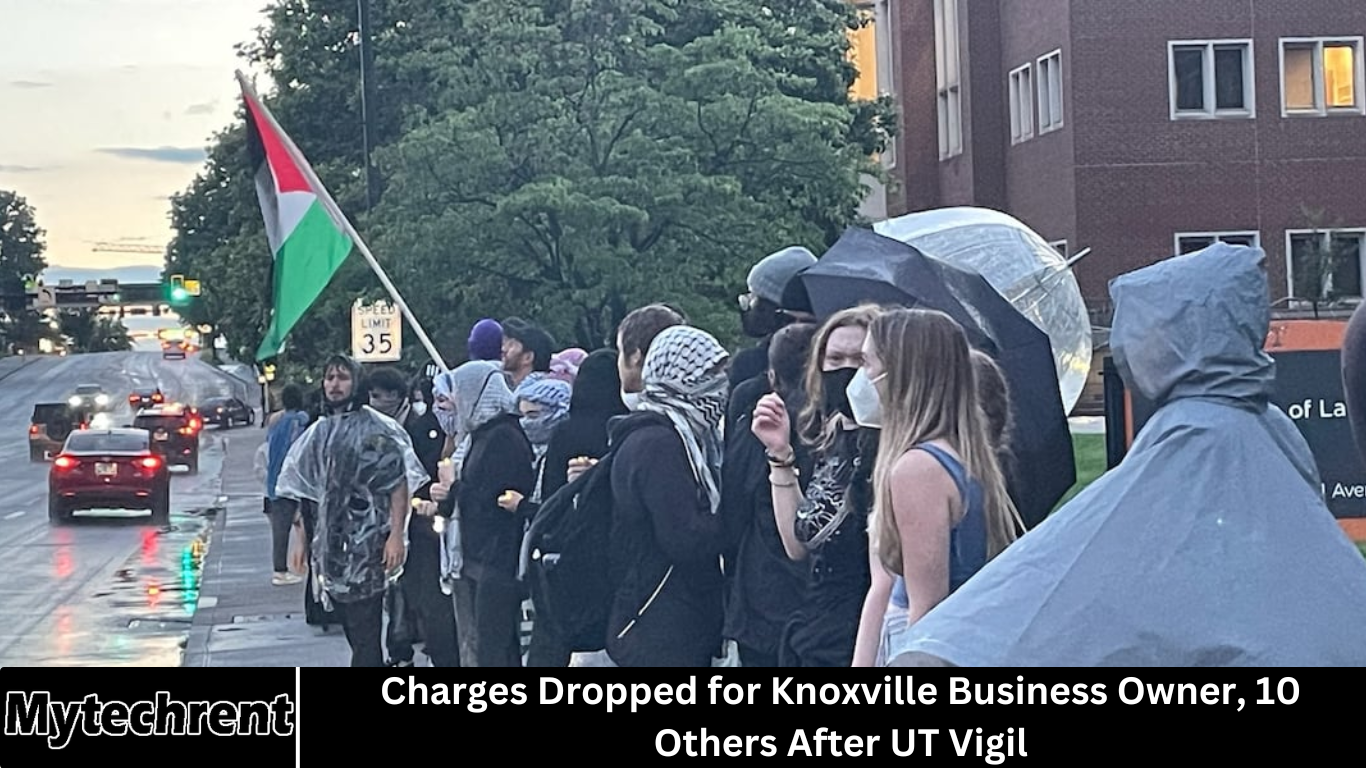Knoxville, TN – In a development that has stirred discussions across legal, activist, and academic circles, charges were officially dropped against a Knoxville business owner and 10 others who were arrested following a peaceful vigil held at the University of Tennessee (UT) campus.
- Background: What Happened at the UT Vigil?
- Who Were the Individuals Arrested?
- Legal Proceedings and Public Response
- Prosecutors Drop Charges: What Led to the Decision?
- Reaction from the Knoxville Business Owner
- University of Tennessee Responds
- Community and Activist Reaction
- The Role of Video Evidence and Witnesses
- Broader Implications for Protest Rights in Tennessee
- What’s Next for the Accused?
- Knoxville’s Ongoing Conversation on Justice and Accountability
- Frequently Asked Question
- Why were the individuals arrested after the UT vigil?
- What led to the charges being dropped?
- Who was the Knoxville business owner involved in the case?
- Was the University of Tennessee involved in the arrests?
- Are the individuals planning legal action after the charges were dropped?
- What impact has this incident had on Knoxville’s protest policies?
- What does this mean for protest rights in Tennessee?
- Conclusion
The decision, announced earlier this week, brings to an end a months-long legal chapter stemming from a protest that sparked citywide attention.
More Read: NATO Allies Invest in Tanks Despite Heavy Losses to Drones in Ukraine
Background: What Happened at the UT Vigil?
The UT vigil in question was held in early 2025 in response to a national wave of protests advocating for social justice, racial equality, and free speech.
Organized by a coalition of students, faculty, and local activists, the vigil was intended as a peaceful gathering to honor victims of police violence and to call attention to systemic injustice.
Held at the heart of the UT Knoxville campus, the vigil drew a diverse crowd, including university students, local clergy, social justice advocates, and small business owners — among them, a well-known Knoxville entrepreneur whose name has not been released publicly due to privacy concerns.
While the event remained mostly peaceful, a heightened police presence and a few moments of confrontation led to the arrests of 11 participants. Authorities at the time cited “failure to disperse,” “obstruction,” and “unlawful assembly” as the primary reasons for the arrests.
Who Were the Individuals Arrested?
Among those detained were students, community organizers, and the aforementioned Knoxville business owner, who has been an active supporter of youth-led activism in the area.
Their arrests were met with immediate backlash from both the university community and civil liberties organizations.
The identities of the individuals have not been disclosed in full, but several spoke out through legal representatives, asserting that they were exercising their constitutional rights to peaceful assembly and free expression.
Legal Proceedings and Public Response
Following the arrests, public support for the accused swelled. Over 15,000 people signed a petition demanding the charges be dropped, and multiple rallies were organized in downtown Knoxville.
Civil rights attorneys took up the cases, arguing that the arrests violated First Amendment protections and lacked probable cause.
Local advocacy groups, including the Knoxville Justice Coalition and the Tennessee Civil Liberties Union, released joint statements condemning the arrests and calling for an immediate review of policing protocols on campus.
“The vigil was peaceful, lawful, and within the bounds of constitutionally protected protest,” said civil rights attorney Rebecca Moore, who represented three of the accused.
“The decision to arrest these individuals was not only legally questionable but morally indefensible.”
Prosecutors Drop Charges: What Led to the Decision?
On Monday, prosecutors in Knox County officially announced that all charges against the 11 individuals had been dropped.
In a press conference, District Attorney General Charme Allen stated that after a thorough review of police bodycam footage, witness testimonies, and legal arguments submitted by defense attorneys, her office concluded that pursuing prosecution was not in the interest of justice.
“We believe that these individuals were exercising their constitutional rights,” said Allen. “There is insufficient evidence to move forward, and it would not serve the public interest to continue with these cases.”
The DA’s office also cited procedural concerns with how the arrests were made, including conflicting reports from law enforcement and lack of clear dispersal orders at the scene.
Reaction from the Knoxville Business Owner
In a written statement shared through legal counsel, the Knoxville business owner expressed relief and gratitude.
“I’m thankful that justice has prevailed. I stood at that vigil not as a business owner, but as a member of this community, standing in solidarity with those calling for change.
I hope this experience will lead to more meaningful conversations about protest, community, and accountability,” the statement read.
The business owner, who runs a popular establishment in downtown Knoxville, has long been known for community involvement, particularly supporting youth education and local arts initiatives.
University of Tennessee Responds
The University of Tennessee has also issued a statement following the dropped charges. While the administration initially remained neutral, university officials have now pledged to reexamine policies around protest and free speech on campus.
“We are committed to fostering an environment where students and community members feel safe and supported in expressing their views,” said UT Chancellor Donde Plowman.
“We will be launching a task force to evaluate our procedures around demonstrations and the role of law enforcement in such events.”
Student organizations welcomed the statement but emphasized the need for action beyond words. “It’s a start, but we need more than committees,” said one student leader. “We need protection for peaceful protesters and a campus culture that values activism.”
Community and Activist Reaction
Local and national activists are hailing the dismissal of charges as a win for civil liberties. Prominent civil rights organizations, including the Southern Poverty Law Center (SPLC) and Black Lives Matter Knoxville, applauded the DA’s decision and called for reforms in how protest-related incidents are handled in the future.
“This is a victory for the First Amendment and a warning to those who seek to criminalize dissent,” said Jasmine Torres, a regional coordinator for BLM Knoxville. “We won’t be silenced, and this moment proves the power of collective resistance.”
The Role of Video Evidence and Witnesses
According to court documents, one of the key turning points in the case was the emergence of video footage captured by attendees and journalists at the vigil. The videos reportedly showed that the crowd was peaceful, and no clear order to disperse was audible in the recordings.
Multiple witnesses also testified that the arrests appeared arbitrary and that law enforcement failed to communicate any intent to declare the gathering unlawful before making arrests.
The defense team used this evidence to argue that the participants’ constitutional rights had been violated and that the arrests lacked lawful justification.
Broader Implications for Protest Rights in Tennessee
The case and its outcome may have lasting impacts on how protests are policed in Tennessee, particularly on college campuses. Legal experts suggest that the dismissal of charges could serve as a precedent in future cases involving peaceful protest and the interpretation of “unlawful assembly.
” Professor Alan Greene, a constitutional law scholar at Vanderbilt University, noted, “This is a textbook case of the courts acting as a check on executive overreach. It reinforces that peaceful protest is not a crime, and that law enforcement must act within constitutional boundaries.”
What’s Next for the Accused?
While the charges have been dropped, some of those arrested are considering filing civil lawsuits against the city and the University of Tennessee Police Department (UTPD) for wrongful arrest and violation of civil rights.
“Our clients were subjected to public humiliation, financial loss, and emotional trauma. Legal accountability must follow,” said attorney Rebecca Moore.
In addition to possible legal action, several of the individuals involved have signaled their intent to continue organizing and advocating for police reform, student rights, and free speech protections.
Knoxville’s Ongoing Conversation on Justice and Accountability
This incident has become part of a broader conversation in Knoxville about justice, accountability, and the role of protest in public discourse.
Local leaders, activists, and educators are engaging in community forums and public town halls to explore ways to protect civil liberties while maintaining public order.
The Knoxville City Council has even placed the issue on its agenda for upcoming meetings, signaling that change may be on the horizon in terms of city policies regarding protest management.
Frequently Asked Question
Why were the individuals arrested after the UT vigil?
The 11 individuals, including a Knoxville business owner, were arrested following a peaceful vigil held on the University of Tennessee campus. Law enforcement cited reasons such as failure to disperse, unlawful assembly, and obstruction. However, video evidence and witness accounts later contradicted those claims, showing the event remained peaceful throughout.
What led to the charges being dropped?
Prosecutors dropped the charges after reviewing bodycam footage, witness statements, and video evidence from the scene. The District Attorney’s office determined that there was insufficient evidence and that the individuals were lawfully exercising their First Amendment rights to peaceful protest and assembly.
Who was the Knoxville business owner involved in the case?
While the identity of the business owner has not been publicly disclosed due to privacy concerns, they are known in the Knoxville community for their local business and civic involvement. Their participation in the vigil was in support of social justice and civil rights.
Was the University of Tennessee involved in the arrests?
The University of Tennessee did not directly conduct the arrests, but campus and local law enforcement were present at the event. After the charges were dropped, UT officials stated their intent to review campus protest policies and reaffirm their commitment to free speech.
Are the individuals planning legal action after the charges were dropped?
Yes, several of the individuals — including the business owner — are considering filing civil lawsuits for wrongful arrest and violation of constitutional rights. Their attorneys have indicated that they may pursue legal accountability for emotional distress and reputational harm.
What impact has this incident had on Knoxville’s protest policies?
The case has sparked renewed public debate in Knoxville about protest rights, police conduct, and civil liberties. Community leaders and advocacy groups are calling for reform in how protests are handled, particularly on college campuses and in public spaces.
What does this mean for protest rights in Tennessee?
This case reinforces the legal protection of peaceful protest under the First Amendment. Legal experts believe the dismissal of charges sets a precedent in Tennessee, emphasizing that individuals cannot be criminalized for lawful, nonviolent demonstrations.
Conclusion
The decision to drop charges against the Knoxville business owner and 10 others following the UT vigil marks more than just a legal resolution — it could represent a turning point for the city and its approach to civil discourse.
As community members reflect on the events of the past year, one thing is clear: the right to protest remains a vital, protected, and necessary part of democracy.
And in this case, that right was ultimately upheld — not only in the courtroom, but in the streets, on campus, and in the hearts of those who continue to stand for justice.








